Contents
Show/Hide
- Who Produced Basketball Cards In The 1960s
- 1968 Willis Reed Topps Test Basketball #7
- 1968 Nate Thurmond Topps Test Basketball #13
- 1961 Fleer Walt Bellamy Rookie Card #4
- 1960 Kahn's Weiners Oscar Robertson Rookie Card
- 1968 John Havlicek Topps Test Basketball Rookie Card #5
- 1961 Fleer Bill Russell #38
- 1961 Fleer Elgin Baylor Rookie Card #3
- 1968 Topps Test Issue Jerry West #19
- 1968 Topps Test Issue Bill Russell #4
- 1968 Topps Test Issue Wilt Chamberlain #1
- 1961 Fleer Jerry West Rookie Card #43
- 1961 Oscar Robertson Fleer Basketball Rookie Card #36
- 1969 Lew Alcindor Topps Rookie Card #25
- 1961 Fleer Wilt Chamberlain Rookie Card #8
- Final Words On The 15 Most Valuable Basketball Cards from the 1960s
The 1960s was one of the great eras in basketball history. It is perhaps best remembered for the exploits of the most incredible team in the annals of the sport, Bill Russell’s Boston Celtics. But it was also the decade where all-time greats like Wilt Chamberlain, Jerry West, and Oscar Robertson made their debuts.
The sport was popular during the decade, and game tickets sold well. However, basketball cards remained in the shadow of their more successful baseball card cousins.
Indeed, as football grew exponentially heading into the Super Bowl era, hoop cards were a distant third.
However, that is a good thing for modern collectors, at least in terms of relative value. Print runs were smaller than the other sports, and fans cared less about their basketball items. Therefore, basketball cards from the 1960s in good shape are a relative rarity.
Who Produced Basketball Cards In The 1960s
As always, Topps led the way. The veteran company began producing basketball cards in 1957, just in time to make the most widely recognized Bill Russell rookie card. But they dropped out of the sport (just as they would again in the 1980s) and would not return until their landmark 1969-1970 “tall boys” card set.
Fleer also produced a beloved basketball set in 1961. But unfortunately, that would be their last until the legendary sets they began producing in the 1980s. But that set has a Wilt Chamberlain rookie, so we are glad they created it.
Between those sets, all we have are a few smaller sets like Kahn’s, Carnation Milk, and team sets. But despite having a pretty poor repertoire to choose from, the 1960s produced some terrific and valuable basketball cards. And we have selected the best and most valuable just for you.
1968 Willis Reed Topps Test Basketball #7
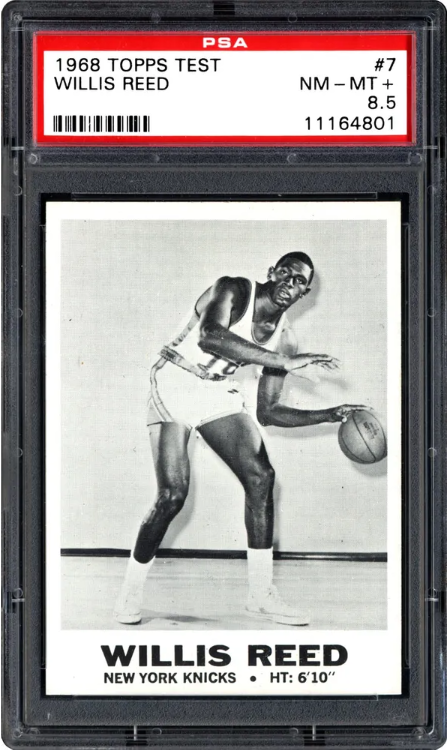
A PSA 8 has a value of $4,057.
At his peak, Willis Reed was one of the best players ever. The man won All-Star Game MVP, regular season MVP, and the NBA Finals MVP in 1970. It doesn’t get much better than that. But unfortunately, his career was repeatedly hampered by injuries. Because of a lack of cards in the mid-1960s, the 1968 Willis Reed Topps Test Basketball #7 card is considered his rookie. But better late than never, and this beautiful-looking set is no classier place to have a first card. And the 6”10 Reed has to crouch more than most to fit in the frame.
1968 Nate Thurmond Topps Test Basketball #13
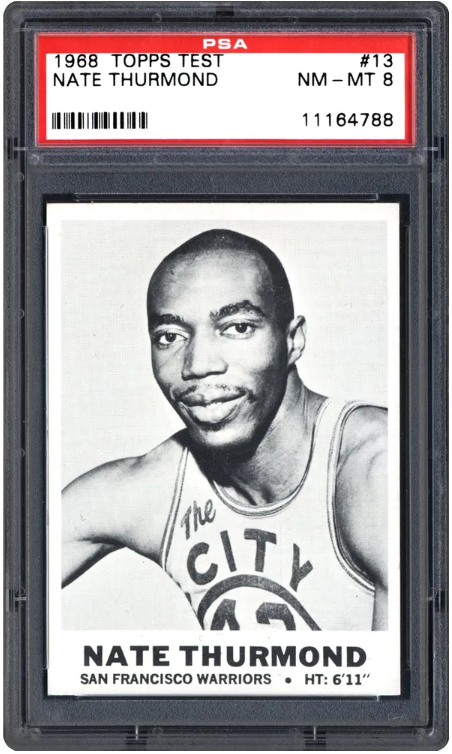
A PSA 8 has a value of $4,272.
In 1968, Topps put together a test set intended for something other than public release. However, in one way or another, some copies circulated. It's a shame they were not released because they have a respectable and classic black-and-white feel that has aged incredibly well. At the time, Topps may have considered the design too old-fashioned for the psychedelic late 1960s.
Nate Thurmond was one of the best centers who ever lived and heir to the revolution Wilt Chamberlain and Bill Russell brought to the position in the 1960s. He combined many of the best traits of both players, so he was the first to notch a quadruple-double in a game with 22 points, 14 rebounds, 13 assists, and 12 blocked shots. And more importantly, he looks great in this classic headshot on the 1968 Nate Thurmond Topps Test Basketball #13 card .
1961 Fleer Walt Bellamy Rookie Card #4
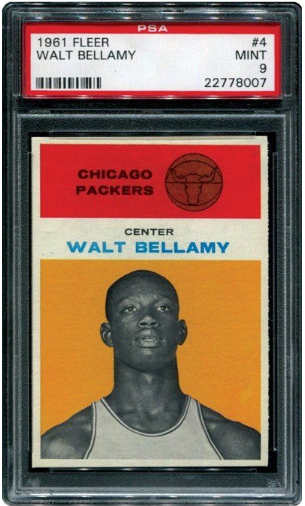
A PSA 9 has a value of $8,122.
Walt Bellamy was one of the best big men of his time, although Bill Russell and Wilt Chamberlain have overshadowed him. For example, though he was Rookie of the Year in 1961, everyone talked about Wilt's breaking records. But the beautiful 1961 Fleer Walt Bellamy Rookie Card #4 shows us clearly who was the best-looking among them. Bellamy is a member of the Basketball Hall of Fame and the College Basketball Hall of Fame.
1960 Kahn's Weiners Oscar Robertson Rookie Card
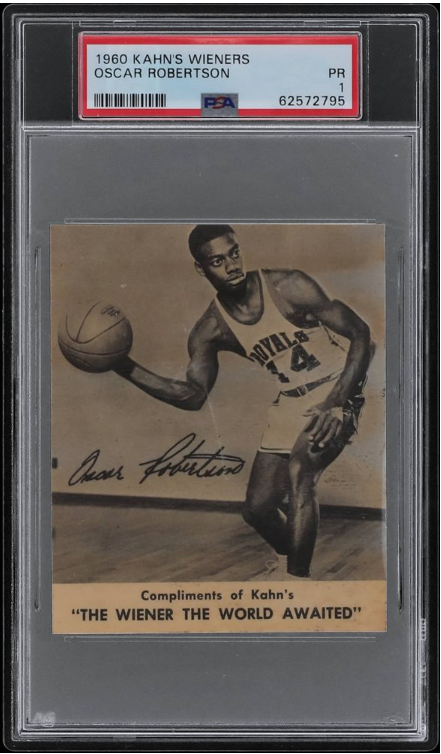
A PSA 8 has a value of $10,100.
Oscar Robertson had a distinctive diagonal way of holding his head when playing, successfully captured in this card and his better-known 1961 Fleer rookie card. The picture and faux auto on the 1960 Kahn's Weiners Oscar Robertson Rookie Card are obviously beautiful. The only question is, do you find the “the wiener the world awaited” cute or distracting? I absolutely love it. There are only 19 graded copies of this rarity. Therefore, I believe current values are extremely low. Getting your hands on one of these (in any grade) is a great idea.
1968 John Havlicek Topps Test Basketball Rookie Card #5
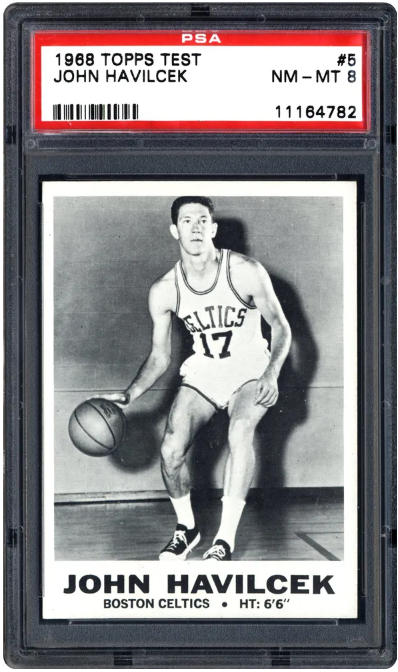
A PSA 8 has a value of $22,100.
Because there were no big card releases in the mid-1960s, the 1968 John Havlicek Topps Test Basketball Rookie Card #5 is considered the players rookie. John Havlicek was an integral part of that fabulous 1960s Celtics team. But he was also the heart and soul of the Celtics team that won the 1974 and 1976 titles. The player is best remembered for the steal that made radio broadcaster Johnny Most scream, "Havlicek stole the ball," in game seven of the 1965 NBA Eastern Division championship series against the Sixers. And, of course, it is amusing seeing the 6”6 John crouching to try and fit in the confines of the card.
1961 Fleer Bill Russell #38
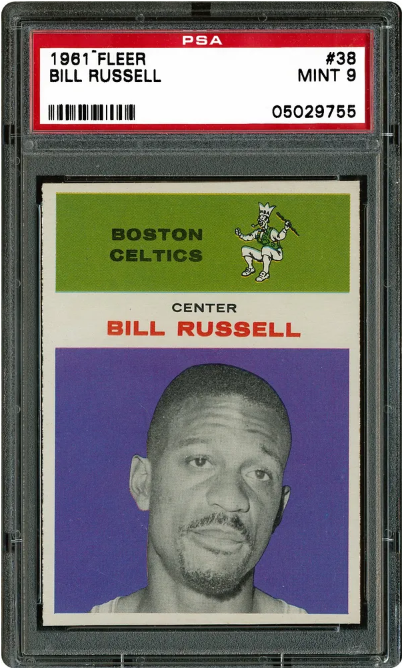
**A PSA 9 has a value of $29,400. **
When you consider how many titles he won, and how he always beat Wilt Chamberlain when it mattered, there is a strong case that Bill Russell was the greatest basketball player ever. While his rookie card was the 1957 Topps basketball card set, the 1961 Fleer Bill Russell #38 is a key card for this legend. And we love Bill’s “do I really have to take another picture” expression.
1961 Fleer Elgin Baylor Rookie Card #3
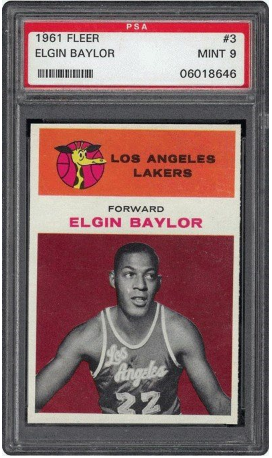
A PSA 9 has a value of $31,986.
It took this 11-time All-Star 15 years to finally win his first and only title. But unlike Moses, he led the Lakers to the promised land. And while the Walt Chamberlain is the best-known card in this crucial release, Elgin Baylor’s card is not as standard. Many people threw it away. So there are only 611 graded copies of the 1961 Fleer Elgin Baylor Rookie Card #3, of which a mere 70 something is graded a PSA 8 or higher.
1968 Topps Test Issue Jerry West #19
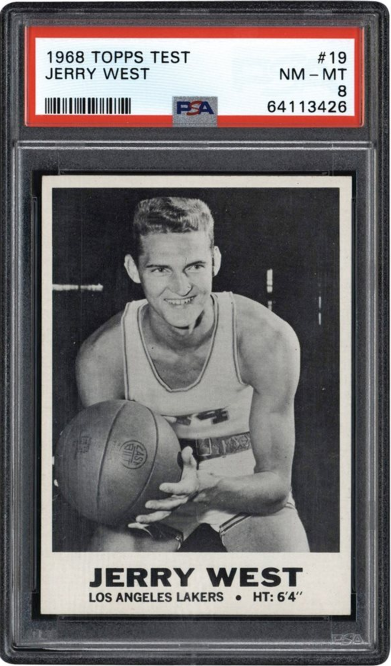
**A PSA 8 has a value of $38,167. **
How can anyone resist the devilish smile featured in the 1968 Topps Test Issue Jerry West #19? If you ever wanted to see basketball legends crouch to fit into the frame, the 1968 Topps Test Issue is the release for you. There are only six of these babies featuring the Lakers icon, so value is guaranteed to increase.
1968 Topps Test Issue Bill Russell #4
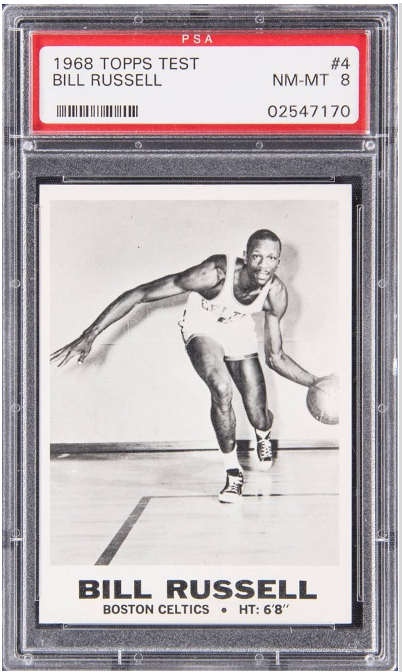
A PSA 8 sold for $46,800.
The 1968 Topps, despite being wonderfully attractive, never enjoyed a full release. Therefore, the few cards that have leaked out are wonderful collectors' items. Like many others in this release, the 1968 Topps Test Issue Bill Russell #4, features our subject crouching to fit in the frame. Although to be fair, if they got less of the gym floor in, he might be able to stand taller. It is worth reminding everyone that aside from being one of the best players in the league, at the time this basketball card was released, [Bill Russell](Bill Russell) was also the first African American coach in league history.
1968 Topps Test Issue Wilt Chamberlain #1
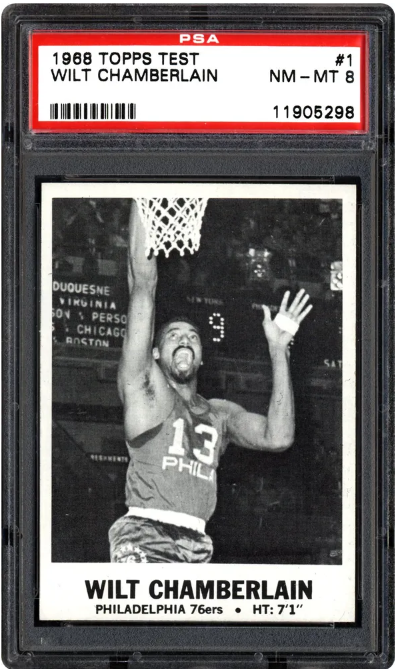
A PSA 8 has a value of $55,200.
The 1968 Topps Test Issue Wilt Chamberlain #1 comes from a series where the players are mostly posing for shots while crouching so their long bodies fit into the frame. However, they decided to go a different route for Wilt and feature a raw action shot of the legend. Maybe he was just too tall to fit into the shot. But whatever the reason, they aced the action shot. You can easily see why this guy was so incredibly dominant.
There are only 11 graded copies of this beautiful 1960s basketball card. Not a single one has been graded above an 8. Due to its scarcity, there is a lot of room for growth on this card.
1961 Fleer Jerry West Rookie Card #43
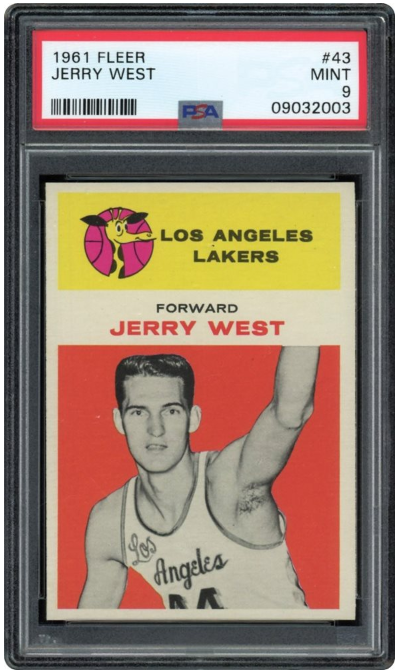
A PSA 9 has a value of $87,000.
Once again, thank goodness for the 1961 Fleer Basketball, for providing us with the 1961 Fleer Jerry West Rookie Card #43, and so many other wonderful basketball cards. Otherwise we wouldn’t have anything like rookie cards for these absolute legends. In Jerry Wests case, we are talking about the model for the NBA logo itself. People remember “Mr. Clutch” as a big time shooter, but he also made the first five NBA All-Defensive teams. Though he won his first title in 1972, he was so good in the 1969 NBA Finals (which his team lost), that he won series MVP.
1961 Oscar Robertson Fleer Basketball Rookie Card #36
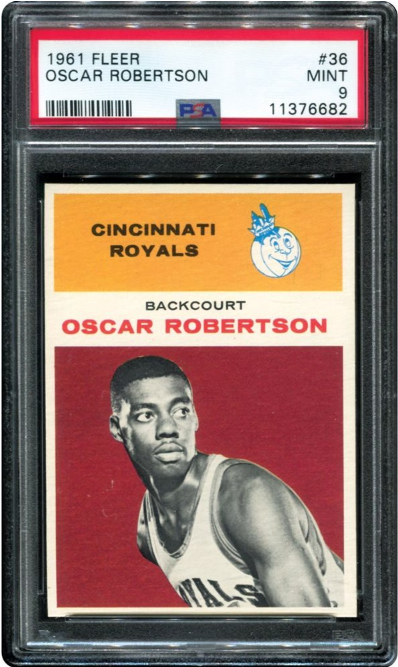
A PSA 9 has a value of $88,000.
Perhaps the most noble-looking rookie card of all time. The 1960s basketball card comes from the good old days when instead of classifying guards, they were referred to as the “backcourt.” The 1961 Oscar Robertson Fleer Basketball Rookie Card #36 has our hero looking like a silent movie star. There is another earlier Oscar Robertson card, as you have seen. But this is the one most taken seriously. This makes sense because it is not a glorified advertisement for wieners.
Though seldom mentioned in GOAT arguments, Oscar was rated #12 all-time by the Athletic and #11 by ESPN. And with the impeccable Fleer 1961 Basketball design, this one just pops. Note there are only 14 PSA 9s out of 1,118 graded copies. And some lucky so and so has a PSA 10.
1969 Lew Alcindor Topps Rookie Card #25
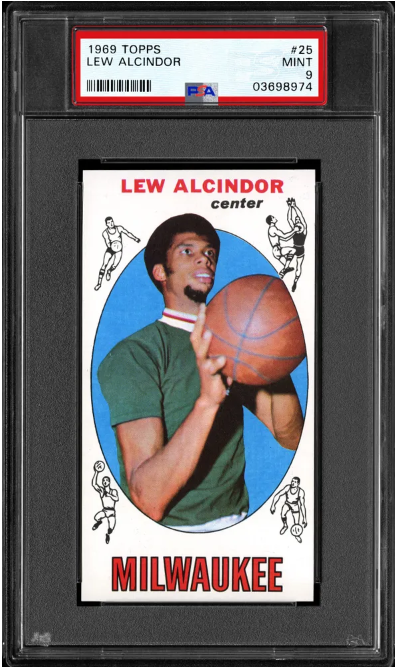
A PSA 10 has a value of $240,000.
Perhaps the best known basketball card of the decade. However, the 1969 Lew Alcindor Topps Rookie Card #25 is certainly not the most attractive. The picture of Lew Alcindor isn’t all that great, the background color is worse, and what is with the doodles in the corner of these cards. But people love 1969 Topps “tall boys” basketball cards and this is a legit rookie card of the former highest career scorer in NBA history, so it's rightfully regarded as a classic. These cards are known for sustaining damage easily, so I have my doubts about whether that PSA 10 was tampered with.
1961 Fleer Wilt Chamberlain Rookie Card #8
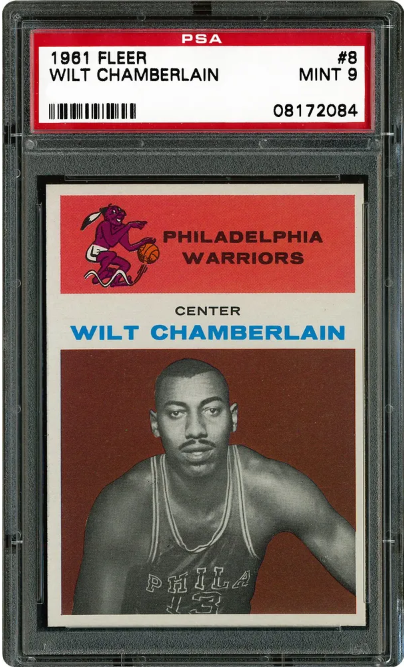
A PSA 9 has a value of $461,250.
Thank goodness for 1961 Fleer Basketball. It provides us with a legit rookie for some of the best players who ever lived (otherwise we would have to rely on hot dog and ice cream cards), and does it with such class and beauty. Wilt Chamberlain certainly qualifies as one of the best. We are talking about a guy who scored 100 points in one game, as everyone knows. But just look at his career averages: 22.9 rebounds per game and 30.1 points. Absolutely insane.
This Fleer set was also quite popular, so the population counts are comparable to football and baseball releases. There are 1,484 graded copies of this 1961 Fleer Wilt Chamberlain Rookie Card #8 card. People kept it, because even in an era where basketball cards weren’t a thing, everyone knew Wilt was special. Therefore, if you aren’t going for a high-grade copy, these aren’t all that expensive.
Final Words On The 15 Most Valuable Basketball Cards from the 1960s
The 1960s offered very few key baseketball card sets. And though the 1969 Topps “tall boys” are the best known, most of the most valuable cards come from the two other key sets: 1961 Fleer Basketball and the 1968 Topps Test Basketball set. Since there are few important sets, and they were not seen as particularly important at the time, population numbers are low. But the biggest names of the decade are absolute immortals of the sport. Players like Wilt Chamberlain, Bill Russell, Kareem Abdul-Jabar and Jerry West will never be forgotten. That combination is a recipe for exceptional value. Many of these 1960s basketball cards have a lot of room to grow.